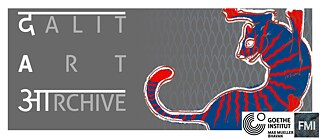Online Film Screening & Discussion
Dalit Art Archive

By Aroh Akunth
Dalit Art Archive is a community archive that seeks to document histories of caste and art from the perspectives of Dalit individuals. In its current form, the archive seeks to build a repository of community knowledge via sourcing works which focus on, but are not limited to: caste-based art forms, manifestations of caste in the arts sector, experiences/barriers of caste in the arts sector, art appreciation/critique of an art piece/artist, interviews with Dalit artists/community historians/ art experts in the form of articles, photo essays, digital stories, academic papers or podcasts.
Aroh Akunth has done their Bachelor’s in Social Sciences from Ambedkar University Delhi. They went on to pursue Criminology at Tata Institute of Social Sciences, Mumbai and are currently doing their Masters’ in Modern Indian Studies from the University of Göttingen, Germany.
________________________________________
Given the current circumstances due to the Corona pandemic, we will be presenting this project online over a few sessions.
________________________________________
Session 1: Tuesday, 14 April 2020
Online Film Screening: 17:00 onwards
Live Discussion: 18:00 onwards
In order to register to participate in Session 1, please write an email here no later than 12.04.2020.
This session will include the screening of the film Kadubai by Omey Anand. The duration of the film is 30 minutes and will be followed by a live discussion between the filmmaker and the Actant Aroh Akunth.
Synopsis
The film is about Kadubai Kharat, a Dalit folk artist who lives in Aurangabad, Maharastra. She sings songs of Babasaheb Ambedkar in various Dalit localities in Aurangabad and runs her family. Kadubai has become famous in Maharastra through social media. In her videos, she sings about Babasaheb's contribution to society, especially towards Dalits. The film highlights the need to bring forward the history of hundreds of Dalit artists, writers and activists who died without any recognition. This film provides a peek into Kadubai’s life, inspired by Babasaheb's ideology, how her songs have raised questions about society, education, health, politics, and more.
About the director
Omey Anand is a filmmaker from Maharashtra and the founder of Nijaat Collective. He is currently completing his Master’s in media and Cultural Studies from TISS, Mumbai. Nijaat means 'to Decaste' in Urdu and can be read as ‘liberation.’ The collective works towards making the medium of film and other art forms accessible to Dalit-Bahujan communities. Their ongoing project Songs of Babasaheb, records Ambedkarite protest music.
________________________________________
In order to register to participate in the discussion, please write an email here no later than 12.04.2020. Once you have registered, you will receive a confirmation mail with further instructions on how to participate in Session 1.
Details
Goethe-Institut / Max Mueller Bhavan New Delhi
3, Kasturba Gandhi Marg, Near Vakil Lane
110001 New Delhi
Part of series Five Million Incidents: New Delhi
YouTube & Instagram